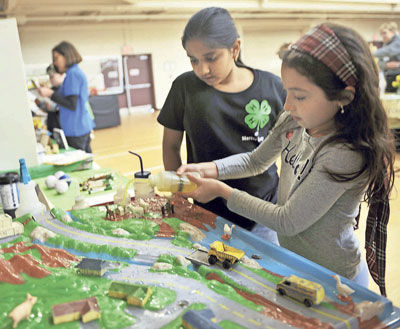By Huck Fairman
Saturday’s 10th annual Local Living Expo, held in Rider University’s gymnasium and organized by the Mercer County Sustainability Coalition gave area residents a chance to sample and hear about a sustainable lifestyle.
The coalition is a partnership made up of green teams from Lawrence Township, Ewing, Hopewell Valley, Princeton, West Windsor, East Windsor, and Trenton, along with nonprofits Sustainable Princeton and Sustainable Lawrence, and the Mercer County Office of Economic Development and Sustainability, and finally, the Stony Brook-Millstone Watershed Association.
Outside, electric cars were on display while their owners stood by to explain their technologies which deliver cost-savings and reduced CO2 emissions.(30 percent of New Jersey’s emissions come from fossil fuel-burning vehicles.)
Inside, the gym was filled with rows of tables displaying local sustainable services, businesses, products, and produce. Schools — notably Rider University, but also the Princeton Learning Cooperative — provided students to answer questions and introduce their schools’, particularly their clubs’, efforts and studies addressing environmental issues. Nonprofits such as the Citizens’ Climate Lobby offered pamphlets, information, and the opportunity to register concern about global warming.
In addition, nine speakers presented short talks on a variety of sustainable issues and solutions.
Those attending the Expo were predominantly Mercer County residents but represented all ages, from students, to parents and their toddlers, to retirees, all wandering and pausing among the tables.
Naturally, most choosing to come were aware, to one degree or another, of sustainability issues and climate change. Thus it was noteworthy to hear the range of interests and concerns that they expressed. Many are already active, in one way or another, while others came to gather more information before deciding. What follows is a sampling of their ideas and actions taken or contemplated.
William and Nancy of Hamilton came to learn about solar options for their home and to gather more information, and possibly seeds, for their organic garden.
Ryan of Lawrence Township had been thinking that a cap-and-trade system seems to be the best strategy to reduce CO2 emissions, and he was hoping to learn more.
Renee of Monroe Township has helped start a community garden which includes plantings of milkweed, essential for Monarch butterflies, which are important pollinators. But she came to gather more information on solar installations.
Maureen of Princeton has recently completed a house that includes many“passive house” features, such as extra insulation, efficient windows, and LED light bulbs. She’s hoping to win a Platinum LEED (Leadership in Energy and Environmental Design,) rating for her house.
Cora and Ed of Ewing rent a community organic garden plot to grow healthy vegetables.
Martha and Yang of West Windsor expressed the hope that schools will plant organic gardens, along with trees, to introduce students to healthy living and sustainability. They also hope that the students will learn to cook the produce they grow, instilling further the idea of healthy diets.
Hayley, a Rider student working at the university’s table, listed the many steps that the school and students have taken toward sustainability, including providing recycling bins for the dorms and schoolwide recycling of computer and electronic components, while also informing students in the dorm of sustainability issues and corrective steps to take.
In addition, Rider is planning to have all new buildings meet LEED guidelines and requirements. Hayley estimated that between 15 and 25 percent of the students are aware and active around sustainability and climate change issues.
Michael of Princeton (and Princeton Creative Marketing,) expressed the hope that more people will educate themselves about the connectednessof all systems: nature’s, our own biological systems, and our social and developed/manufactured systems.
Sharon of Hamilton spoke of her interest in organic gardens and composting.(the town of Princeton offers a once-a-week composting collection service to its residents for $65 per year.)
Samantha of Belle Mead works with the Stony Brook/Millstone Watershed Association presenting sustainability and environmental education to students, both in their schools and at the watershed.
Peggy of Hamilton has installed solar panels on her roof, using a Power Purchasing Agreement (PPA) which requires no money down. She has also switched to LED light bulbs and tends an organic garden. She said that she is very happy that so many young people are becoming aware and active around our great environmental challenges.
Nathaniel, a student at the Princeton Learning Cooperative, takes an environmental sustainability class and at the same time is helping to design an action plan for the All Saints Church which hosts the PLC.
In speaking to these Mercer residents, I found the pervasive mood to be one of quiet intention, even determination, to take action related to one or more of the sustainability or environmental issues that surround and affect us.
Huck Fairman is a Princeton author who writes SOLUTIONS on a regular basis for the Packet Media Group.

